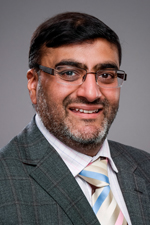Published on: 25 May 2023
Get set for the Bank Holiday weekend – that’s the message from healthcare leaders as they prepare for the upcoming three day break.
South Tyneside and Sunderland NHS Foundation Trust is asking people to ensure they use the right services as the final Bank Holiday in May approaches.
Patients are urged to get their repeat prescription orders in and stock up their medicine cupboard with essentials, including painkillers, plasters, indigestion remedies and anti-diarrhoea medicine.
The advice to be prepared is issued in the hope people can avoid any unnecessary visits to hospital.
The plea comes as the weather forecast predicts a sunny and warm weekend and into the school half-term holiday.

Dr Shaz Wahid, the Trust’s Executive Medical Director, said:
"We know people will be looking forward to the Bank Holiday weekend. We want people to stay as safe as possible and turn to the right place if they do need the help of the NHS.
"The Emergency Departments at our hospitals are always busy and more so during Bank Holidays. We want to make sure our teams are not under even more pressure and this will help them deal with patients who are most seriously ill.
"We can all play a part in doing this.
"Make sure you have enough of your medication on hand to see you through to next week, and get any repeat prescriptions that you need ordered. It’s also always a good idea to have a well-stocked first aid cabinet.
"We know it’s likely to be sunny, so prepare for those conditions if you’re outdoors. Sun cream and plenty of drinks is really important this time of year.
"We also know people might want to enjoy an alcoholic drink or two if they’re out socialising. We want people to have a good time, but please do it sensibly and take care of yourself and anyone you’re with."
"GP surgeries will be closed from this Friday and will reopen on Tuesday.
"Some pharmacies will be open this weekend and a list of them is online if you need to know where they are.
"Pharmacists are great at offering advice and support for lots of conditions and ailments. They can also help assess you and suggest medications for minor illness and injuries."
Online help is available 24/7 via NHS 111 while parents and can use excellent resources such as The Little Orange Book or Healthier Together websites for information and advice.
Anyone who needs emergency care should call 999 or go to their nearest Emergency Department.
People should only do this if someone has a serious, life-threatening emergency, such as:
- signs of a heart attack - chest pain, pressure, heaviness, tightness or squeezing across the chest
- signs of a stroke - face dropping on one side, cannot hold both arms up, difficulty speaking
- sudden confusion (delirium) – they cannot be sure of own name or age
- suicide attempt - by taking something or self-harming
- severe difficulty breathing - not being able to get words out, choking or gasping
- choking on liquids or solids
- heavy bleeding - spraying, pouring or enough to make a puddle
- severe injuries after a serious accident or assault
- seizure (fit) - shaking or jerking because of a fit, or unconscious (cannot be woken up)
- sudden, rapid swelling of the lips, mouth, throat or tongue
British Sign Language (BSL) speakers can make a BSL video call to 999.
Deaf people can use 18000 to contact 999 using text relay.
Anyone who is concerned about how much they, or someone they know, drinks, there is lots of help available.
Speak to your GP, find your local alcohol support service, or contact Drinkline on freephone 0300 123 1110 or Alcoholics Anonymous on 0845 769 7555.







